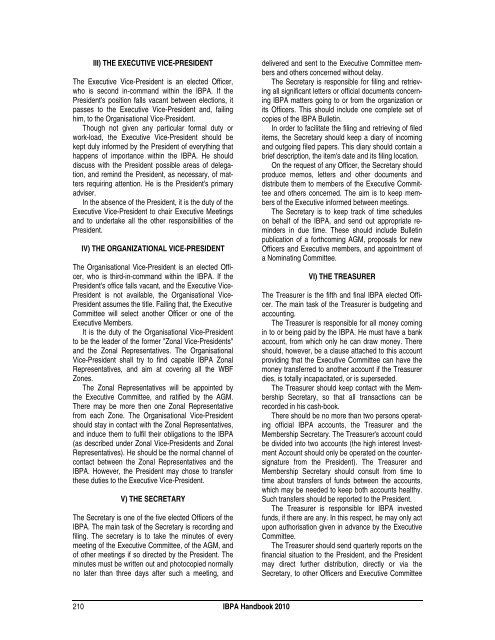Handbook - International Bridge Press Association
Handbook - International Bridge Press Association
Handbook - International Bridge Press Association
You also want an ePaper? Increase the reach of your titles
YUMPU automatically turns print PDFs into web optimized ePapers that Google loves.
III) THE EXECUTIVE VICE-PRESIDENT<br />
The Executive Vice-President is an elected Officer,<br />
who is second in-command within the IBPA. If the<br />
President's position falls vacant between elections, it<br />
passes to the Executive Vice-President and, failing<br />
him, to the Organisational Vice-President.<br />
Though not given any particular formal duty or<br />
work-load, the Executive Vice-President should be<br />
kept duly informed by the President of everything that<br />
happens of importance within the IBPA. He should<br />
discuss with the President possible areas of delegation,<br />
and remind the President, as necessary, of matters<br />
requiring attention. He is the President's primary<br />
adviser.<br />
In the absence of the President, it is the duty of the<br />
Executive Vice-President to chair Executive Meetings<br />
and to undertake all the other responsibilities of the<br />
President.<br />
IV) THE ORGANIZATIONAL VICE-PRESIDENT<br />
The Organisational Vice-President is an elected Officer,<br />
who is third-in-command within the IBPA. If the<br />
President's office falls vacant, and the Executive Vice-<br />
President is not available, the Organisational Vice-<br />
President assumes the title. Failing that, the Executive<br />
Committee will select another Officer or one of the<br />
Executive Members.<br />
It is the duty of the Organisational Vice-President<br />
to be the leader of the former "Zonal Vice-Presidents"<br />
and the Zonal Representatives. The Organisational<br />
Vice-President shall try to find capable IBPA Zonal<br />
Representatives, and aim at covering all the WBF<br />
Zones.<br />
The Zonal Representatives will be appointed by<br />
the Executive Committee, and ratified by the AGM.<br />
There may be more then one Zonal Representative<br />
from each Zone. The Organisational Vice-President<br />
should stay in contact with the Zonal Representatives,<br />
and induce them to fulfil their obligations to the IBPA<br />
(as described under Zonal Vice-Presidents and Zonal<br />
Representatives). He should be the normal channel of<br />
contact between the Zonal Representatives and the<br />
IBPA. However, the President may chose to transfer<br />
these duties to the Executive Vice-President.<br />
V) THE SECRETARY<br />
The Secretary is one of the five elected Officers of the<br />
IBPA. The main task of the Secretary is recording and<br />
filing. The secretary is to take the minutes of every<br />
meeting of the Executive Committee, of the AGM, and<br />
of other meetings if so directed by the President. The<br />
minutes must be written out and photocopied normally<br />
no later than three days after such a meeting, and<br />
210 IBPA <strong>Handbook</strong> 2010<br />
delivered and sent to the Executive Committee members<br />
and others concerned without delay.<br />
The Secretary is responsible for filing and retrieving<br />
all significant letters or official documents concerning<br />
IBPA matters going to or from the organization or<br />
its Officers. This should include one complete set of<br />
copies of the IBPA Bulletin.<br />
In order to facilitate the filing and retrieving of filed<br />
items, the Secretary should keep a diary of incoming<br />
and outgoing filed papers. This diary should contain a<br />
brief description, the item's date and its filing location.<br />
On the request of any Officer, the Secretary should<br />
produce memos, letters and other documents and<br />
distribute them to members of the Executive Committee<br />
and others concerned. The aim is to keep members<br />
of the Executive informed between meetings.<br />
The Secretary is to keep track of time schedules<br />
on behalf of the IBPA, and send out appropriate reminders<br />
in due time. These should include Bulletin<br />
publication of a forthcoming AGM, proposals for new<br />
Officers and Executive members, and appointment of<br />
a Nominating Committee.<br />
VI) THE TREASURER<br />
The Treasurer is the fifth and final IBPA elected Officer.<br />
The main task of the Treasurer is budgeting and<br />
accounting.<br />
The Treasurer is responsible for all money coming<br />
in to or being paid by the IBPA. He must have a bank<br />
account, from which only he can draw money. There<br />
should, however, be a clause attached to this account<br />
providing that the Executive Committee can have the<br />
money transferred to another account if the Treasurer<br />
dies, is totally incapacitated, or is superseded.<br />
The Treasurer should keep contact with the Membership<br />
Secretary, so that all transactions can be<br />
recorded in his cash-book.<br />
There should be no more than two persons operating<br />
official IBPA accounts, the Treasurer and the<br />
Membership Secretary. The Treasurer's account could<br />
be divided into two accounts (the high interest Investment<br />
Account should only be operated on the countersignature<br />
from the President). The Treasurer and<br />
Membership Secretary should consult from time to<br />
time about transfers of funds between the accounts,<br />
which may be needed to keep both accounts healthy.<br />
Such transfers should be reported to the President.<br />
The Treasurer is responsible for IBPA invested<br />
funds, if there are any. In this respect, he may only act<br />
upon authorisation given in advance by the Executive<br />
Committee.<br />
The Treasurer should send quarterly reports on the<br />
financial situation to the President, and the President<br />
may direct further distribution, directly or via the<br />
Secretary, to other Officers and Executive Committee


